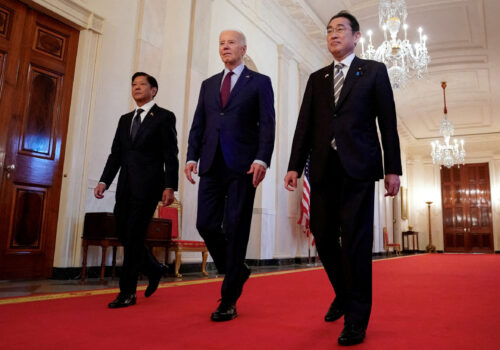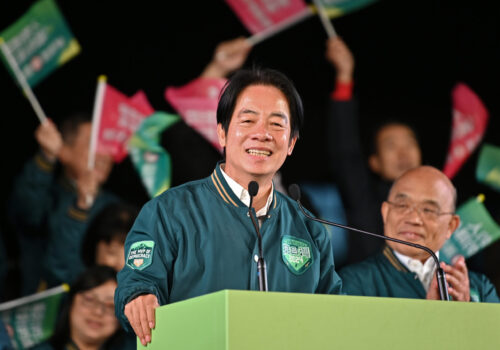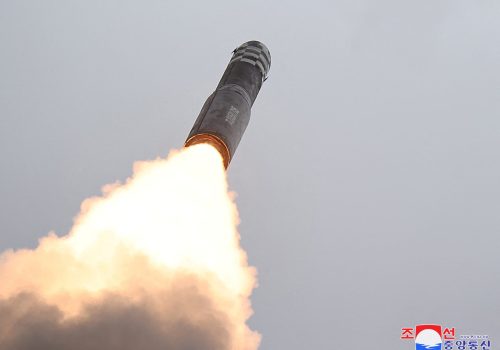The Philippines’ domestic politics are the wildcard in its trilateral partnership with the US and Japan
“When we stand as one, we’re able to forge a better future for all,” declared US President Joe Biden, flanked by Japanese Prime Minister Fumio Kishida and Philippine President Ferdinand Marcos Jr. The three leaders met at the White House in April to announce a new “trilateral chapter” for the United States, Japan, and the Philippines. The three nations share an interest in maintaining a free and open Indo-Pacific and protecting the existing global order based on international law. They also share deep concerns about China. In particular, they reject China’s militarization of reclaimed features and maritime claims in the South China Sea, as well as Beijing’s attempts to change the status quo by force or coercion in the East China Sea.
But as Biden’s remarks suggest, this new trilateral arrangement depends on the three countries working together. With the US-Japan relationship strong and the United States the strongest power among the three, it is the US relationship with the Philippines that will in large part determine the viability of this trilateral partnership. Manila’s approach to Washington is influenced by more than just what the Philippines faces beyond its borders, however. It is in many ways at the mercy of Philippine domestic politics.
Domestic challenges to a stronger partnership
The trilateral meeting on April 11 was a boost to the Philippines. Following their historic meeting, the three leaders issued a statement calling for a partnership for peace and security. They pledged to cooperate in support of a free and open Indo-Pacific through measures intended to enhance Philippine Coast Guard capacity building, improve the interoperability of maritime forces through joint naval exercises, and strengthen coordination to promote maritime domain awareness. They also agreed to deepen cooperation on humanitarian assistance and disaster relief, and to enhance maritime law enforcement training to counter China’s illegal, unreported, and unregulated fishing.
The Philippine president was essential to making the White House meeting such a success. Marcos appears to be charting a stable policy course forward, but influence operations by both former Philippine President Rodrigo Duterte and China threaten to undermine trilateral cooperation. Marcos, a Duterte political rival, won the Philippine presidency by a landslide in May 2022. Despite expectations that he would continue Duterte’s tilt toward Beijing, Marcos has moved Manila closer to Washington. In response, the Duterte faction is openly attacking Marcos and the US-Philippines alliance. Duterte’s primary vehicle is Sonshine Media, the media outlet of a religious movement led by pastor Apollo Quiboloy, who is wanted by the FBI for sex trafficking and bulk cash smuggling. The Duterte camp also relies on its social media troll army, which posts pro-China, anti-US propaganda across a range of social media platforms, principally Facebook.
Another threat to the nascent trilateral partnership is Chinese influence operations. China had a friend in Duterte. Marcos’s tilt toward Washington means that China likely will step up “United Front” work in the Philippines. One possible case is in the news now. The mayor of the small Philippine city of Bamban in the country’s northeast has a series of irregularities in her background that have led authorities to investigate her citizenship and one lawmaker to question whether she is a Chinese asset. The mayor, Alice Guo, has no school records and her birth certificate was registered only when she was seventeen years of age. She has said that she is the abandoned love child of a Chinese man and a Filipino domestic helper, and that she was home schooled on a pig farm.
These irregularities have raised a red flag about Guo’s candidacy and election as mayor in light of a large offshore gaming center near Bamban. Philippine law enforcement discovered that the center was a front for scammers and raided it in March 2023. The center was located near Guo’s office on land she had partially owned, though she said she sold the land before becoming mayor in 2022, and she has admitted to previous ties with one of the companies involved in the gambling operation. Philippine authorities suspect the Chinese-backed online gambling firms of being centers of Chinese espionage, as well as human trafficking and drug manufacture. They are also allegedly involved in hacking and surveillance activities, especially of government websites. Bamban is also in close proximity to the rotating bases used by the United States and the Philippines. Philippine Senator Risa Hontiveros, who first exposed this irregularity, has been holding senate hearings into this development.
Other Philippine elected officials openly court Beijing. For instance, Cagayan Provincial Governor Manuel Mamba has consistently sought closer ties with Beijing and has opposed the current basing agreement with the United States. Mamba strongly opposed Marcos’s expansion of the US military presence under the Enhanced Defense Cooperation Agreement (EDCA) into Cagayan Province in 2023. In recent years, thousands of Chinese nationals have enrolled in colleges in the northeastern region of Cagayan near military bases designated in the EDCA, raising suspicions that Chinese nationals are attempting to infiltrate the region.
What is working for trilateral cooperation
The threat to the burgeoning trilateral partnership is mitigated by a couple of factors. The first of these is the long-standing cultural, diplomatic, and military ties enshrined in the 1951 US-Philippines Mutual Defense Treaty. These official ties are further strengthened by more than four million Filipino-Americans and by the common bond that arises from such personal affiliations. Views of the United States in the Philippines remain positive; a Pew Research Center report published in 2020 found that 80 percent of Filipinos surveyed had a favorable view of the United States. Regarding the present standoff in the South China Sea/West Philippine Sea between the Philippines and China, a recent poll revealed that 43 percent of Filipinos prefer their country align with the United States, while only 3 percent approved of a similar alignment with China.
The second factor is the lack of deliverables to show for six years of Duterte’s pro-China policy. During Duterte’s presidency, the Chinese coast guard and maritime militia continued to destroy the marine environment, plunder the natural resources of the Philippines’ exclusive economic zone, and harass Filipino fishermen. Moreover, the massive Chinese investments that Duterte had repeatedly promised never materialized. In contrast, the most recent US congressional aid package to Ukraine, Israel, and Taiwan included $500 million in direct military assistance to the Philippines.
Policy initiatives
Although current internal Philippine domestic political considerations might be insufficient to derail trilateral cooperation, the current Philippine vice president and daughter of Rodrigo Duterte, Sara Duterte, may run for the presidency in 2028. Her victory might again alter the political landscape. However, a robust and tangible demonstration of support by Western nations before then might help to shore up popular support for the current policy and blunt any change of policy in a future administration. There are five ways in which the trilateral partnership can be sustained and deepened.
- Demonstrate support. The United States, Japan, and Australia should demonstrate commitment and resolve to the Philippines through both military and diplomatic means. The $500 million in military assistance recently appropriated by Congress can go to air-defense systems and upgrades for the Philippine air force and navy. The United States must be ready to commit more funding in the future to truly modernize these forces.
- Foster deeper ties among allies. The United States, Japan, and Australia should initiate closer diplomatic and person-to-person ties with the Philippines. One option is for the Philippines to follow the trend toward international education. The US State Department and the US Embassy in Manila should propose a US-Philippines academic exchange.
- Support and expand the existing four bases that the United States is using jointly with the Philippine military. New bases, opened under the 2014 EDCA, will allow the United States to rotate troops to a total of nine bases throughout the Philippines. The most recent joint defense exercises were highly successful. In April 2024, US and Philippine military personnel engaged in live-fire exercises as part of their annual “Balikatan,” (Tagalog for “shoulder-to-shoulder”) maneuvers. The exercises (involving some 16,000 personnel) addressed maritime security, sensing and targeting, air and missile defense, missile strikes, cyber defense, and information operations. The idea is to demonstrate a joint determination and readiness to assist the people affected by natural calamities as well as affirm the teamwork and strength of the alliance.
- Assist civil authorities. US forces are in the Philippines not only to enhance the Philippine military, but also to assist civil authorities in cases of natural disasters. The Philippines is especially prone to catastrophes such as coastal flooding, devastating typhoons, and earthquakes. Although the United States has provided timely and comprehensive assistance in the past, the prepositioning of essential supplies and equipment in bases used jointly by the US and Philippine militaries will not only assist in any future catastrophe but will also send a signal about the United States as a true ally.
- Share intelligence. To counter threats from China, the United States, the Philippines, Japan, and Australia need to collect and share intelligence. Sharing intelligence will help thwart Chinese efforts to infiltrate and weaken the Philippines as part of its “gray zone” tactics. The ongoing and intensification of China’s naval blockade of shoals and reefs in the Philippines’s exclusive economic zone also reveals the further need for intelligence gathering and sharing between the two allies.
An alliance is only as strong as its weakest link. Fractured domestic politics and China’s influence operations in the Philippines make that country’s participation in a trilateral partnership with the United States and Japan questionable. The United States needs to formulate a detailed Philippine policy that would involve a number of US agencies and their contacts with the Philippines government. The five aforementioned proposals are a good place to start.
Elizabeth Freund Larus is a nonresident senior fellow at the Atlantic Council’s Global China Hub.
James Rice taught in the law faculty at the National University of Malaysia (1989-1992) and in the department of philosophy at Lingnan University, Hong Kong (1992-2018). He currently lives in Vigan, Philippines.
Further reading
Thu, Apr 11, 2024
Experts react: Biden pursues an ambitious global agenda with Japan and the Philippines. Can they deliver?
New Atlanticist By
The US president met with Japanese Prime Minister Fumio Kishida and Philippine President Ferdinand Marcos Jr. this week in Washington.
Fri, May 17, 2024
Taiwan’s new president has a nationalist reputation. It could be an asset when dealing with Beijing.
New Atlanticist By Wen-Ti Sung
Incoming Taiwanese President William Lai is known as a “pragmatic worker for Taiwan independence,” but there's more to the story.
Wed, Aug 16, 2023
The United States and its allies must be ready to deter a two-front war and nuclear attacks in East Asia
Report By Markus Garlauskas
This report highlights two emerging and interrelated deterrence challenges in East Asia with grave risks to US national security: 1) Horizontal escalation of a conflict with China or North Korea into simultaneous conflict; 2) Vertical escalation to a limited nuclear attack by either or both adversaries to avoid conceding.
Image: USA President Joe Biden, center, with Ferdinand Marcos Jr., Philippines' president, left, and Fumio Kishida, Japan's prime minister, right, arrive during a trilateral meeting in the East Room of the White House in Washington, DC, USA, on Thursday, April 11, 2024. USA President Joe Biden is set to unveil joint military patrols and training with the Philippines and Japan as the allies seek to counter an increasingly assertive China in the South China Sea. Photo by Al Drago/Pool/ABACAPRESS.COM


